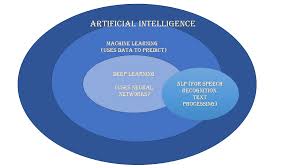Understanding AI Data Analytics: Transforming the Future of Business
In today’s fast-paced digital world, data is being generated at an unprecedented rate. The ability to analyse this data effectively has become crucial for businesses seeking to maintain a competitive edge. Enter AI data analytics—a transformative approach that leverages artificial intelligence to extract valuable insights from vast datasets, enabling organisations to make informed decisions and drive innovation.
The Role of AI in Data Analytics
AI data analytics refers to the use of machine learning algorithms and other AI techniques to process and analyse large volumes of data. Unlike traditional analytics methods, AI can handle complex datasets with ease, identifying patterns and trends that might be missed by human analysts.
By automating the analysis process, AI not only speeds up decision-making but also enhances accuracy. This capability is particularly valuable in industries such as finance, healthcare, marketing, and supply chain management, where timely insights can significantly impact outcomes.
Key Benefits of AI Data Analytics
- Enhanced Decision-Making: With real-time analytics powered by AI, businesses can make quicker and more informed decisions. This agility is essential in responding to market changes and customer demands.
- Improved Efficiency: Automation of repetitive tasks allows employees to focus on strategic activities. AI systems can process vast amounts of data without fatigue or error, reducing operational costs.
- Predictive Insights: AI algorithms excel at predictive analytics, enabling businesses to anticipate future trends and consumer behaviour. This foresight helps in risk management and strategic planning.
- Personalised Customer Experiences: By analysing customer data, AI can help tailor products and services to individual preferences, enhancing customer satisfaction and loyalty.
Challenges in Implementing AI Data Analytics
Despite its advantages, implementing AI data analytics comes with challenges. One major hurdle is ensuring data quality; inaccurate or incomplete data can lead to misleading insights. Additionally, integrating AI systems with existing IT infrastructure requires careful planning and investment.
There are also ethical considerations surrounding the use of personal data. Companies must navigate privacy laws and ensure transparency in how they collect and use information.
The Future of AI Data Analytics
The future looks promising for AI data analytics as advancements continue at a rapid pace. With improvements in natural language processing (NLP) and deep learning technologies, we can expect even more sophisticated analytical capabilities that will further transform business operations.
As organisations increasingly adopt these technologies, those that embrace the potential of AI-driven insights will be well-positioned for success in an ever-evolving marketplace.
Conclusion
AI data analytics is revolutionising how businesses operate by providing actionable insights from complex datasets quickly and accurately. While challenges remain in implementation and ethical considerations must be addressed responsibly—embracing this technology offers significant benefits for those looking to stay ahead in a competitive landscape.
The journey towards fully harnessing the power of AI in data analytics is just beginning—and it promises exciting opportunities for innovation across industries worldwide.
Six Essential Tips for Effective AI Data Analytics
- Ensure data quality by cleaning and preprocessing data before analysis.
- Use appropriate algorithms and models for different types of data and analysis goals.
- Regularly update and validate AI models to maintain accuracy and relevance.
- Consider ethical implications when collecting, processing, and using data for analytics.
- Implement robust security measures to protect sensitive data from breaches or misuse.
- Collaborate with domain experts to gain valuable insights from AI-driven analytics.
Ensure data quality by cleaning and preprocessing data before analysis.
Ensuring data quality is a critical step in the AI data analytics process, as it significantly impacts the accuracy and reliability of the insights generated. Before any analysis can take place, it’s essential to clean and preprocess the data to eliminate errors, inconsistencies, and redundancies. This involves tasks such as removing duplicate entries, correcting inaccuracies, handling missing values, and converting data into a suitable format for analysis. By investing time in these preliminary steps, businesses can enhance the quality of their datasets, leading to more precise analytical outcomes. Ultimately, this meticulous approach helps organisations make well-informed decisions based on accurate and trustworthy information.
Use appropriate algorithms and models for different types of data and analysis goals.
Selecting the appropriate algorithms and models is crucial when working with AI data analytics, as it directly impacts the accuracy and relevance of the insights gained. Different types of data and analysis goals require tailored approaches; for instance, time-series data might benefit from models like ARIMA or LSTM, while classification tasks could utilise decision trees or support vector machines. Understanding the nature of the dataset and the specific objectives of the analysis helps in choosing the most effective tools. This ensures that businesses can derive meaningful insights that align with their strategic goals, ultimately leading to more informed decision-making and optimised outcomes.
Regularly update and validate AI models to maintain accuracy and relevance.
In the rapidly evolving field of AI data analytics, regularly updating and validating AI models is crucial to maintaining their accuracy and relevance. As data patterns and business environments change over time, models that were once effective can become outdated, leading to inaccurate predictions or insights. Regular updates ensure that AI systems are aligned with current data, enhancing their ability to deliver reliable outputs. Additionally, ongoing validation helps identify any drift in model performance, allowing for timely adjustments. This proactive approach not only optimises the functionality of AI models but also ensures that businesses continue to derive meaningful value from their data analytics efforts.
Consider ethical implications when collecting, processing, and using data for analytics.
When engaging in AI data analytics, it’s crucial to consider the ethical implications associated with collecting, processing, and using data. Organisations must ensure that they handle personal and sensitive information responsibly, adhering to privacy regulations such as the General Data Protection Regulation (GDPR). Transparency is key; individuals should be informed about how their data is being used and for what purposes. Additionally, businesses must strive to eliminate biases in their AI models to prevent unfair or discriminatory outcomes. By prioritising ethical considerations, companies not only protect themselves from legal repercussions but also build trust with their customers and stakeholders, ultimately fostering a more sustainable and equitable use of technology.
Implement robust security measures to protect sensitive data from breaches or misuse.
Implementing robust security measures is essential when dealing with AI data analytics, particularly to safeguard sensitive data from breaches or misuse. As organisations increasingly rely on AI to process and analyse vast amounts of information, the risk of cyber threats and data breaches becomes more pronounced. It is crucial to establish comprehensive security protocols, including encryption, access controls, and regular audits, to ensure that data remains protected throughout its lifecycle. By prioritising data security, companies can maintain trust with their clients and stakeholders, comply with regulatory requirements, and prevent potential financial and reputational damage that could arise from data misuse or unauthorised access.
Collaborate with domain experts to gain valuable insights from AI-driven analytics.
Collaborating with domain experts is crucial for maximising the potential of AI-driven analytics. These experts bring a deep understanding of industry-specific nuances and challenges, which can significantly enhance the interpretation of data insights generated by AI systems. By working closely with domain specialists, organisations can ensure that the analytical models are not only technically sound but also contextually relevant. This collaboration enables businesses to translate complex data outputs into actionable strategies that align with their specific goals and market conditions. Ultimately, integrating the expertise of domain professionals with AI capabilities leads to more informed decision-making and a greater competitive advantage.






